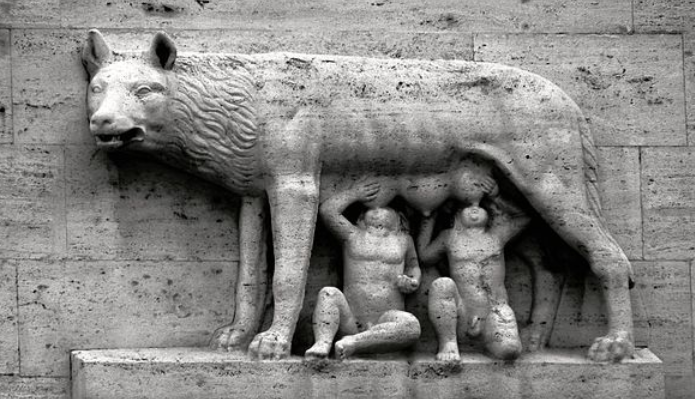
Lupercalia was a Roman feast of purification. It was dedicated to the she-wolf who saved Romulus and Remus, the traditional founders of the City of Rome. The centre of the festivities in Rome was a cave called the Lupercal. This was, supposedly, where the wolf suckled the twin brothers until they were rescued by Faustulus, a shepherd.
The Lupercalia was also called dies Februatus. The word seems to be derived from proto-italic word februum for purification by making an offering. The purification instruments were called februa. This is the basis for the Roman month named Februarius and our February.
The deity of the month was Neptune.
Parentalia
We are also in the middle of the Parentalia, which began on the 13th February and lasted nine days. It honoured parents and family ancestors. People would visit the family tombs found along the roadsides outside of the City. Here they would honour the ancestors by making offerings.
Goddesses of the Family Heath
There would be a family banquet and offerings made to the Lares – the household deities. Romans had a household altar for their worship. The Greek Goddess Hestia was the Goddess of the Hearth – the centre of any household, and Vestal was the Roman equivalent. Dickens borrowed the concept of the Household Gods in his Christmas book ‘the Chimes’.
According to Wikipedia the Codex-Calendar of 354, shows that 13 February had become the holiday Virgo Vestalis parentat. This was a public holiday which by then appears to have replaced the older Parentalia.
For more on Roman Burials and the Festivals of the dead look at my post here:
On This Day
The Day that Christ overcame the devil is a day off work
In the Laws of King Alfred the Great, February 15th, the day Christ overcame the devil, was a day off for freemen. I think this is the day Jesus overcame temptation in the Desert – normally the first day in Lent. Lent of course varies with the date of Easter, but the law code says the 15th is the day off. I delve more into Days off in the Anglo Saxon Calender on August 15th.
15 February 1748 Jeremy Bentham was born. He was a utiltarian philosopher, who believed ethics consisted on contributing to the great good of humanity. He also founded University College, London – London’s first univeristy. Founded in 1826. Have a look at this page to discover more. My part in his story is that the mother of my children was a textile conservator and one of her first projects was to sort Jeremy Bentham out. He did not believea person survived death and in order to encourage free thought, he ordered that his body should be publically disected. His skeleton was then dressed in a suit, stuffed with straw, adorned with a case of his head, put in a chair. Placed in a cupboard, only to be brought out to chair committees running the College. He’d got a bit dusty over the years, and a little frayed at the edges. So he was made spick and span.
!5 February 1915 British Troops retake trenches near St Eloi – for more on this read my post here:
Discover more from And Did Those Feet
Subscribe to get the latest posts sent to your email.
